Missouri: Monitoring Data Trends after 2018 Justice Reinvestment Initiative Reforms
In 2017, Missouri sought technical assistance under the Justice Reinvestment Initiative (JRI) program to address various challenges in the state’s criminal justice system. The policies adopted by the state were reflected in House Bill 1355, which was signed into law in June 2018. Missouri has met and exceeded early implementation projections in JRI priority policy areas. The prison population continued to decline following the implementation of sentencing changes in 2017 and JRI reforms in 2018. The Missouri Parole Board completed an overhaul of its decision-making processes in 2019. And a substance use treatment program pilot has transitioned into a sustained community program with 7 providers serving individuals in 10 locations across the state. These impacts and more are summarized in this brief.
Background
In 2017, Missouri sought technical assistance under the Justice Reinvestment Initiative (JRI) program, which is funded by the U.S. Department of Justice’s Office of Justice Programs, Bureau of Justice Assistance and The Pew Charitable Trusts, to address various challenges in the state’s criminal justice system. At that time, Missouri’s prison incarceration rate was eighth highest in the country, with probation and parole revocations accounting for more than half of all prison admissions. Violent crime had increased 13 percent between 2010 and 2016, following what had been a downward trend in previous years. The state lacked sufficient capacity to respond to people in the criminal justice system who were assessed as needing treatment for substance use disorders or mental health conditions, and most quality substance use treatment programming was located inside state prisons instead of in the community. Additionally, the Missouri Parole Board was interested in modernizing its parole release guidelines to incorporate guidelines related to readiness for community reentry based on risk and needs assessment, program completion, and other relevant criteria that research and best practices hold up as effective for parole decision-making. The policies adopted by the state were reflected in House Bill (HB) 1355, which was signed into law in June 2018.
This legislation authorized broad statutory and administrative changes aimed at reforming Missouri’s criminal justice system. Governor Mike Parson created the Justice Reinvestment Executive Oversight Committee (EOC) in September 2018 to oversee implementation of the legislative changes. That committee identified six priority policy areas to focus on for initial implementation of the provisions of HB 1355:
1. Support local law enforcement efforts to address violent crime.
2. Implement evidence-based practices at the Department of Corrections (DOC) and adopt gender-responsive requirements to improve approaches toward and outcomes of women in DOC custody.
3. Repurpose the state’s six Community Supervision Centers (CSCs) to offer day-reporting and residential capacity, serve as a sanction for noncompliance, and provide cognitive behavioral interventions and other risk-reducing programming for people struggling to comply with the conditions of community supervision.
4. Modernize the parole decision-making process.
5. In partnership with the Missouri Department of Mental Health, establish the Justice Reinvestment Initiative Treatment Pilot (JRITP) as a community-based substance use treatment system for people in the criminal justice system that provides comprehensive services for individuals on supervision who are at high risk for revocation.
6. Improve the experience of victims of crime by removing compensation eligibility barriers, improving victim notification services, and improving the processing of Sexual Assault Forensic Evidence (SAFE) kits.
Visit our website for additional information.
Impacts of Legislation
Missouri has met and exceeded early implementation projections in Justice Reinvestment Initiative priority policy areas. The prison population continued to decline following the implementation of sentencing changes in 2017 and Justice Reinvestment Initiative reforms in 2018. The Missouri Parole Board completed an overhaul of its decision-making processes in 2019. The substance use treatment program pilot (JRITP) has transitioned into a sustained community program, renamed the Improving Community Treatment Success (ICTS) program, with 7 providers serving individuals in 10 locations across the state currently. An additional 2 sites launched in 2021, in Camden and Miller counties.
Public Safety Impacts
The efforts associated with the JRI reforms of 2018 to reduce violent crime across the state contributed to a decline in crime rates. However, the COVID-19 pandemic reversed some of the promising trends, particularly in homicides and aggravated assaults. In fact, across nearly all states in the country, the pandemic was marked by an increase in homicides and assaults in both 2020 and 2021.
The DOC adopted a new risk instrument, the Ohio Risk Assessment System (ORAS) both inside state prisons and with community supervision training staff, completing assessments for more than 80 percent of the DOC population by June 2020. The DOC also implemented evidence-based programs to improve its overall operations. While it will take more time before the impact of investments in the behavioral health treatment of individuals in the criminal justice system can be quantified, early results from the ICTS program and the repurposing of CSCs suggest that participants benefit from the targeted and intensive programming. Additionally, the Office of the Governor and the Missouri legislature continue to be impressed by the ICTS program and its collaborative approach to improving success for people on supervision. Both branches of government are interested in further expansion.
Missouri Prison Population: Actual and Projected, 2010–2023¹

Much of the decline in the prison population can be attributed to sentencing changes passed in 2014 and implemented in 2017. The impact of these sentencing changes was most pronounced in 2018 and 2019. Specific JRI policies intended to reduce revocations to prison are having some effect in reducing the prison population, but it is not possible to distinguish the JRI policy impacts from the COVID-19 impacts. Pandemic-related changes to court functions and supervision practices in 2020 and 2021 combined to produce a historically low state prison population.
Selected Policy and Reform Outcomes
Phase I analysis of Missouri’s criminal justice system culminated in a number of policies to address the increasing level of violent crime, the rising number of annual admissions to prison, and the lack of access to substance use and behavioral health treatment in communities for people in the justice system. In each of the six priority policy areas, progress has been made and work continues.
Reduce Violent Crime²

One of the key goals of the Justice Reinvestment Initiative was to address the amount of violent crime in Missouri and to improve the resources that law enforcement has in order to work collaboratively with their communities and partners to do so. The JRI Violent Crime Workgroup has worked strategically in early implementation to learn about the needs of law enforcement to effectively address violent crime by fielding a statewide survey, conducting six regional law enforcement focus group interviews, and working with nationwide experts to develop a grant funding approach to meet those needs. While promising results were seen in 2019 in terms of decreasing violent crime rates statewide, the 2020 COVID-19 pandemic reversed some of those trends. As in other states across the country, in Missouri the number of homicides and aggravated assaults increased in 2020 compared to 2019. The Violent Crime Working Group will determine the best strategic way forward to address this concerning trend.
Implement Evidence-Based Practices³

The DOC has prioritized a number of administrative changes, including adopting the ORAS for people incarcerated in Missouri prisons (Prison Intake Tool and Prisoner Re-Entry Tool) and for people on supervision (Community Supervision Tool). Several cognitive behavioral intervention programs have been implemented in Community Supervision Centers, including Decision Points, Moving On, and a cognitive behavioral intervention program tailored for substance use disorders (CBI-SA). Probation and parole officers have received training in Carey Guides and Brief Intervention Tools (BITS) to support evidence-based programs for community supervision practices; additionally, some institutions have received training in and have implemented the BITS model. The Carey Group also provided training in case management and planning.
Through the Justice Reinvestment Initiative, the DOC has assessed and examined all its administrative policies and practices to make supporting positive behavior change the focus of the correctional continuum. To do this, new practices for incorporating risk and need assessment into case planning and case management have been implemented, as have new behavior response matrices for both institutional and community corrections that prioritize incentivizing positive behavior while also holding people accountable for negative behavior. A new section within the Office of Research, Planning, and Process Improvement, the Quality Assurance & Process Improvement unit, ties data entry and collection to staff training and ongoing quality improvement so that staff receive timely feedback about how their work impacts outcomes and how they could improve upon their individual and collective practices. The DOC has committed to an evidence-based, effective correctional practices organizational culture, and while they are still in the early stages of this shift, they are already seeing improved outcomes for staff and clients.
Repurpose Community Supervision Centers (CSCs)4

There are six CSCs in the state, all of which have been repurposed to serve as alternatives to revocation for people struggling to fulfill the conditions of supervision successfully. The CSCs are part of the response matrix for community supervision and serve as a last intervention prior to revocation for people who are at a high risk of being reincarcerated or sent to prison for the first time (in the case of people on probation). The CSC in Fulton, Missouri, serves women only and features a gender-responsive curriculum with trauma-informed programming designed to effectively respond to women’s unique needs. All six CSC facilities offer cognitive behavioral intervention programs and have created partnerships with local community-based service providers, academic institutions, and faith-based programs to create opportunities for clients to connect to prosocial networks in the community.
Modernize Parole Board Decision-Making5
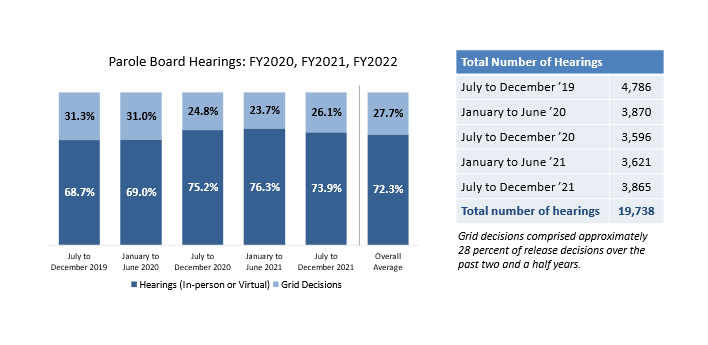
The Missouri Parole Board worked in partnership with the DOC, the CSG Justice Center, and the National Parole Resource Center to update its decision-making process to incorporate the new ORAS risk assessment scores. The board then analyzed its decision-making data for the previous five years to develop a new framework for release that incorporates time-to-serve guidelines, program completion, and institutional conduct into a grid system. This “grid release” functionality greatly reduces the number of release hearings the board conducts by automatically approving release for people who have served the statutorily required percentages of their sentences and who were convicted of drug and certain nonviolent, lower-level felony offenses. For other release decisions for people who are at a potentially higher risk of reoffending or who have more complex needs to incorporate into a readiness for release plan, the board can hold a virtual or in-person hearing. In addition to creating this new system for release, Parole Board members have also been trained in motivational interviewing techniques, and the board has revised the role of the Institutional Parole Officer (IPO) to ensure greater collaboration between the IPO and DOC case managers in preparation for parole release processes and hearings.
Improving Community Treatment Success (ICTS)6
Formerly the Justice Reinvestment Initiative Treatment Program (JRITP)
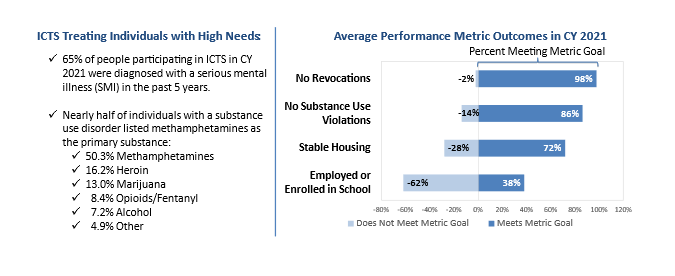
Launched as a pilot program in three counties (Boone, Butler, and Buchanan) in September 2018, the ICTS program has been serving individuals on community supervision who are at a high risk of revocation due to substance use disorders and/or co-occurring substance use disorders with mild to moderate mental health conditions. Ten counties were being served as of December 2020, and an additional two counties launched ICTS program sites in 2021.
Improving Community Treatment Success (cont.)7
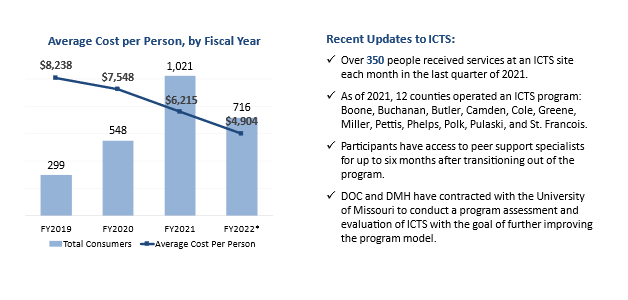
The chart above shows an increase in the number of people receiving treatment through the ICTS program while the average cost per person continues to decline.
Improving Support for Victims of Crime8
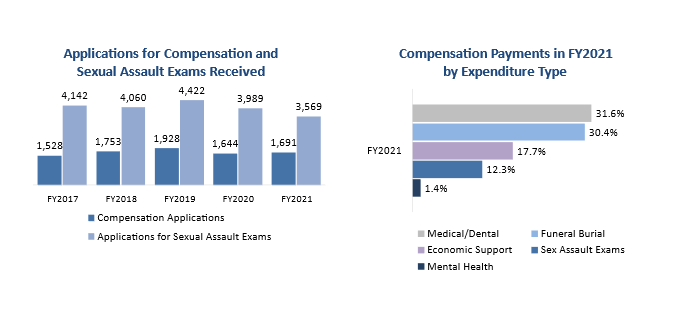
The Office for Victims of Crime at the Missouri Department of Public Safety receives and processes compensation applications and applications for sexual assault exams. Changes to the Crime Victim Compensation Program were intended to increase applications received, increase approvals, and improve the tracking of approvals for quality assurance purposes. Both compensation applications and the number of applications for sex assault exams increased after the JRI reforms in 2018 went into effect; however, the COVID-19 outbreak reversed the trend. The number of applications for compensation and the number of sex assault exams in FY2020 and FY2021 dropped below the FY2019 level.
Inventory and Analysis of Sexual Assault Forensic Exams (SAFE) Kits9
A multidisciplinary working group composed of law enforcement representatives, forensic laboratory staff, prosecutors, health care providers, and victim advocates conducted a detailed inventory of all organizations in Missouri that may possess SAFE kits that need to be processed and analyzed. The inventory effort was completed in November 2019, and analysis of the inventoried kits began in February 2020. Once results are available, eligible DNA profiles are uploaded to the Combined DNA Index System, a criminal DNA database that attempts to match the DNA against existing records. The Missouri State Highway Patrol Criminal Laboratory has been receiving more SAFE kits than can be processed, which has resulted in a backlog of cases. Fortunately, the department has received funding through a Victims of Crime Act grant to outsource testing of approximately 1,000 sexual assault kits. Additionally, the Bureau of Justice Assistance awarded the Attorney General’s Office $2 million in funding to continue this initiative.
Ongoing Work Related to Reforms
• In 2020, the DOC engaged in a Justice Program Assessment (JPA) to evaluate programming in correctional settings across the state with the goal of understanding which currently available programming is in line with research and best practices, which programming is responsive to risk and need as assessed in the ORAS, and which programming areas need improvement. Results of the JPA were delivered to the DOC in June 2020, and implementation has started.
• Subaward funding was directed toward the following:
-
- Implement evidence-based practices at the DOC to improve assessment and case planning.
- Further engage the Missouri judiciary in JRI by conducting training for judicial stakeholders to understand the rules, tools, and best practices promoted by Justice Reinvestment Initiative legislation and to assist in the formation of justice system regional partnerships to support the reforms.
-
-
- ■ A Criminal Justice Regional Summit was held in February 2020, followed by monthly virtual events August–December 2020 that convened circuit teams led by the judiciary and included prosecuting attorneys, public defenders, private defense attorneys, sheriffs, local law enforcement representatives, probation and parole officers, behavioral health treatment providers, representatives from academic institutions, and other community stakeholders. Workshops equipped presiding judges and community teams with the knowledge and tools needed to improve responses to individuals interacting with the criminal justice system, including people with behavioral health needs. The curriculum for these approaches is guided by the Sequential Intercept Model and the Leading Change Guide.
-
-
- Assist local communities by funding solutions to barriers to effective approaches to violent crime noted in the 2019 JRI and Violent Crime Reduction Report and collaborate with the above judicial and regional approaches to improving justice outcomes within regional working groups.
Reinvestments10
|
JRI Policy |
Appropriations |
|||
| HB1355 (2018) | 2019 | 2020 | 2021 | 2022 |
| $ 5,000,000 for ICTS | $ 1,000,000 for ICTS | $ 6,000,000 for ICTS | $ 6,000,000 for ICTS | |
| Additional Criminal Justice Related Appropriations in 2021 | • Crisis stabilization center ($15M) • Community mental health liaisons and substance use disorders liaisons ($5.3M) • Supplemental budget for investigating violent crime ($1.8M) • Local Violent Crime Prevention Grant Program ($500,000) • DPS Witness Protection Services Program ($2M) • DPS Operation Legend Grant ($1.1M) |
|||
Endnotes
1. Actual population figures are provided by the Missouri Department of Corrections in monthly reports; CSG Justice Center modeled the impact projection through FY2023.
2. Missouri State Highway Patrol, https://showmecrime.mo.gov/public/Browse/browsetables.aspx.
3. Missouri Department of Corrections, ORAS Implementation Weekly Progress Report 2020/06/29 and Data Metrics JRI May 2020 – with ORAS.
4. Missouri Department of Corrections, “JRI Data Metrics Oct–Dec 2021 Community Supervision Centers.xlsx” and “JRI Report to Governor.pdf,” December 2021.
5. Missouri Department of Corrections, “Quarterly Hearings Total.xlsx” dated 12/31/2021.
6. Missouri Department of Mental Health’s “ICTS_Services_Report_Q2_2022.xlsx”, and “JRI Annual Report to the Governor.pdf”.
7. Missouri Department of Mental Health, Division of Behavioral Health, “ICTS_Services_Report_Q2_2022.xlsx”.
8. Missouri Department of Public Safety, Office for Victims of Crime.
9. Missouri State Highway Patrol Crime Lab, January 12, 2022.
10. CSG Justice Center summary of Missouri reinvestments.
Photo credit: Visitjeffersoncity, CC BY-SA 3.0, via Wikimedia Commons.
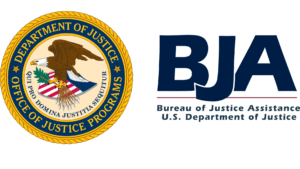
This project was supported by Grant No. 2019-ZB-BX-K002 awarded by the Bureau of Justice Assistance. The Bureau of Justice Assistance is a component of the Department of Justice’s Office of Justice Programs, which also includes the Bureau of Justice Statistics, the National Institute of Justice, the Office of Juvenile Justice and Delinquency Prevention, the Office for Victims of Crime, and the SMART Office. Points of view or opinions in this document are those of the author and do not necessarily represent the official position or policies of the U.S. Department of Justice.
Project Credits
Writing: Angela Gunter, Alison Martin, CSG Justice Center
Research: Angela Gunter, CSG Justice Center
Advising: Laura van der Lugt, Elizabeth Lyon, CSG Justice Center
Editing: Leslie Griffin, CSG Justice Center
Public Affairs: Brenna Callahan, CSG Justice Center
Web Development: Catherine Allary
About the authors












